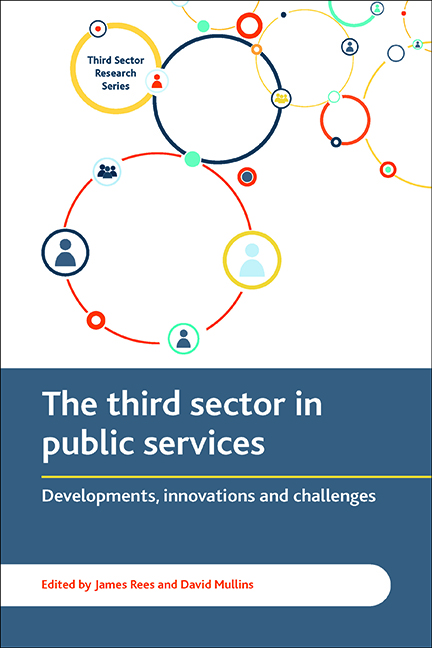Book contents
- Frontmatter
- Contents
- List of tables, figures and boxes
- Series editor’s foreword
- Notes on contributors
- one The third sector delivering public services: setting out the terrain
- Part One Policy, politics and organisations
- Part Two Cross-cutting issue for third sector service delivery
- Part Three Service delivery in key policy fields
- Index
ten - From development to delivery: personalisation and the third sector
Published online by Cambridge University Press: 05 April 2022
- Frontmatter
- Contents
- List of tables, figures and boxes
- Series editor’s foreword
- Notes on contributors
- one The third sector delivering public services: setting out the terrain
- Part One Policy, politics and organisations
- Part Two Cross-cutting issue for third sector service delivery
- Part Three Service delivery in key policy fields
- Index
Summary
Introduction
Personalisation emerged as a dominant policy narrative for the reform of adult social care in England in the early 2000s, and at the end of the New Labour period it looked set to become a major paradigm in other public policy areas too (Needham, 2011). While its influence outside social care has since waned somewhat, its principles and terminology remain at the heart of the new Care Act 2014 in England and within key healthcare reforms, such as the introduction of personal health budgets.
Personalisation claims to offer increased choice and control for service users through the implementation of personal budgets, along with the provision of more personalised services, tailored around people's particular circumstances. Third sector organisations (TSOs) were highly instrumental in the developments that led to personalisation as the key adult social care policy direction, and continue to play a major role in the shaping of practice and delivery on the ground. Yet personalisation is an ambiguous and controversial policy development, which has simultaneously been promoted and contested by those with very different interest and perspectives (Needham and Glasby, 2014). Depending on your persuasion, it can be seen as a mechanism to achieve an individualistic neo-liberal marketplace of public sector competition, or as an empowering process that enables disadvantaged people to collectively shape and influence the types and availability of services on offer (Beresford, 2014).
This chapter examines the role and perspective(s) of the third sector in these debates. We trace the key role of the disability and service-user led movement in developing the principles of personalisation – particularly choice and control – in England. We then critically examine the designing of personalisation in government policy, linking personalisation to policies aimed at the expansion of the adult social care market. We go on to assess the implications and impacts of delivering personalisation for TSOs. We conclude with current challenges facing personalisation in adult social care and public services more generally, and what this means for the third sector and its relationships with the public sector. We address the wider themes of the book in the following ways:
• We recognise the role of the third sector as an innovator or catalyst for a new model of public services provision – in this case personalisation – then adopted and implemented more widely across the public sector (‘looking out’).
- Type
- Chapter
- Information
- The Third Sector Delivering Public ServicesDevelopments, Innovations and Challenges, pp. 189 - 210Publisher: Bristol University PressPrint publication year: 2016



